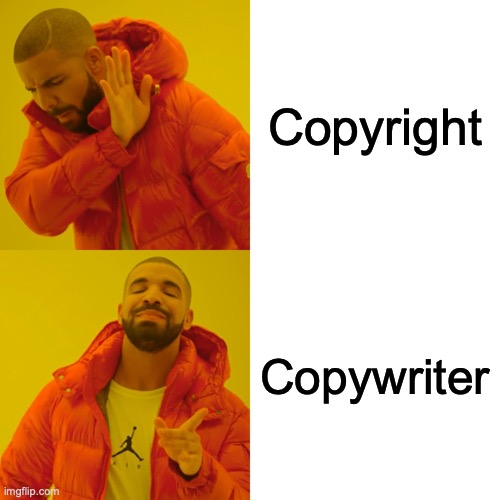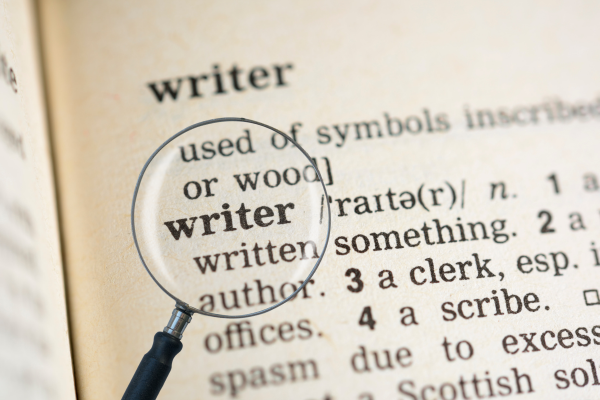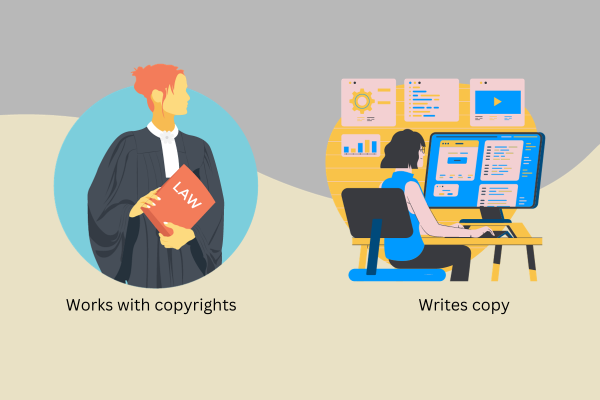When I tell people that I’m a copywriter, they usually respond with something along the lines of, “Oh, cool. So like, the legal rights to stuff?”
Nope.
Not that I can blame them. It’s a common misunderstanding. The two words sound the exact same when you say them aloud. In fact, when I meet new people these days, it usually involves clarifying that a copywriter (that’s me) is different to a copyrighter (that’s not me).
I bet all copywriters have had to explain this. And, for all I know, a lot of intellectual property lawyers who work in copyrighting have had to explain it as well. It’s hard to do succinctly. And even harder when you’re at a party with loud music and you’ve had a few cold ones.
I’ll cover the difference between copywriter and copyright in detail throughout this article. But for now, here’s the TL; DR…
The Main Difference Between Copywriter And Copyright Is In The ‘Write’ Vs ‘Right’
A copyWRITER is a type of writer. They write words for company websites, slogans, sales funnels, ads, and marketing materials.
A copyRIGHT relates to legal rights. It’s more of an intellectual property type of thing. The rights to your book, your song, your artwork, or your idea for a movie about time-travelling ducks (please don’t steal my idea, this is just an example).
Got it? Cool. Let’s dig a little deeper.

Official Dictionary Definitions Of Copywriter And Copyright
It would be remiss of me to talk about the difference between two words without including the official dictionary definitions. So, I went to America’s most trusted online source for word meanings, the Merriam-Webster dictionary. Here are their definitions:
Copyright is “the exclusive legal right to reproduce, publish, sell, or distribute the matter and form of something (such as a literary, musical, or artistic work).”
Copywriter is “a writer of advertising or publicity copy.”
The copywriter definition refers to being a writer of ‘copy’, which highlights another difference between the meaning of the two words.

The ‘Copy’ Part Of Copywriter
Copywriters write words for marketing material. In the industry, we call those words ‘copy’.
You interact with copy every day, whether you realise it or not. Copy is on billboards, websites, Google and Facebook ads, product descriptions, emails, sales letters, brochures, and catalogues. Any time somebody wants to sell something or get your attention, copy will likely be involved. In 2022, the copywriting industry had a market size valued at a whopping $21 billion. The best copywriters are in high demand (despite the rise of AI) and get paid a LOT of money.
If you want an even greater in-depth explanation of what copywriters do all day, you can check that out here.
The ‘Copy’ Part Of Copyright
For copyright, the ‘copy’ part of the word refers to the verb, ‘to copy’. A copyright stops other people from ripping off your work and using it as their own. If they do copy you, you have the legal right to fight back and protect your intellectual property. It’s a way of making sure you get the credit (and the cash), instead of someone else passing it off as their own.
Who Owns A Copyright?
Every country has different laws, but generally, you will get copyright protection once you complete your work in tangible form. For extra protection, you can register your copyright with official channels and use the copyright symbol ©.
The person who creates the work owns the copyright automatically. However, there are a few exceptions, such as when:
- The creator has assigned the copyright in advance
- The creator is employed and created the work as part of their job
- The creator is commissioned to do the work. For example, a video for a wedding, or a portrait for a client.
Who Works With Copyrights?
Not me. After all, I’m a copywriter. Not a lawyer qualified to give a legal opinion.
Intellectual property lawyers are professionals who specialise in copyrights. These legal experts know all about copyrights, trademarks, patents, and trade secrets. They can help you protect your creative works and give advice on copyright registration, licensing, infringement issues, and enforcement of intellectual property rights.

Famous Real-World Examples Of Copyrights
Some of the most famous copyrighted works include:
- Characters like Mickey Mouse, Sonic The Hedgehog, SpongeBob, and Pokémon,
- Movies like Avatar and The Matrix
- Songs like Bohemian Rhapsody, Stairway To Heaven, and Piano Man
- Novels like The Lord of the Rings, The Hunger Games, and Harry Potter
It’s important to make a distinction between a copyright and a trademark. Copyrights protect creativity in tangible form. Trademarks protect names, logos, symbols, designs, or slogans that are used to distinguish goods or services in the marketplace (think the Coca-Cola logo or the iPhone name).
Famous Real-World Examples Of Copywriting
The most famous copywriting example was a headline David Ogilvy wrote for Rolls-Royce:
“At 60 miles an hour the loudest noise in the new Rolls-Royce comes from the electric clock.”
He used it to emphasise the luxurious and quiet nature of Rolls-Royce vehicles. In his book Confessions of an Advertising Man, Ogilvy said this was his best headline. But there is debate about whether he technically wrote it – after all, it was reportedly a quote from the Editor of The Motor magazine.
Another great example is from one of the most famous female copywriters in history, Frances Gerety. Gerety transformed the diamond industry with her iconic campaign for De Beers, introducing the slogan “A Diamond is Forever.”
By associating diamonds with enduring love, Gerety increased the number of first-time brides buying diamonds from 10% to over 80% by 1990. Her slogan remains a cornerstone of De Beers’ advertising and was named the slogan of the 20th century by Advertising Age in 1999, securing Gerety’s legacy in advertising history.
If you’re curious to see more copywriting in practice, you can take a look at some good and bad copywriting examples here.
Can You Copyright Your Copywriting? When Copywriting And Copyrights Overlap
Who owns the copy written by copywriters? That’s a good question. And it’s one you should discuss with your legal team. After all, if you hire a copywriter to write copy for your brand, you may want to own the rights.
At The Copy Brothers, we transfer ownership of our copy to the buyer after it’s completed and paid. Our clients often take the headline or ad copy we write, and re-use it in other areas of their marketing. It helps them keep their brand voice consistent and gives them extra bang for their buck.
Conclusion
Hopefully that clears the air on the difference between copywriter and copyright. While the two words sound similar, they have distinct meanings. I can hear copywriters around the world breathing a collective sigh of relief, knowing they can now simply DM a link to this article when their “What do you do for a living?” explanation hits a roadblock.
If you’d like to hire a copyWRITER (not copyrighter), then you can contact us here for a free chat.
